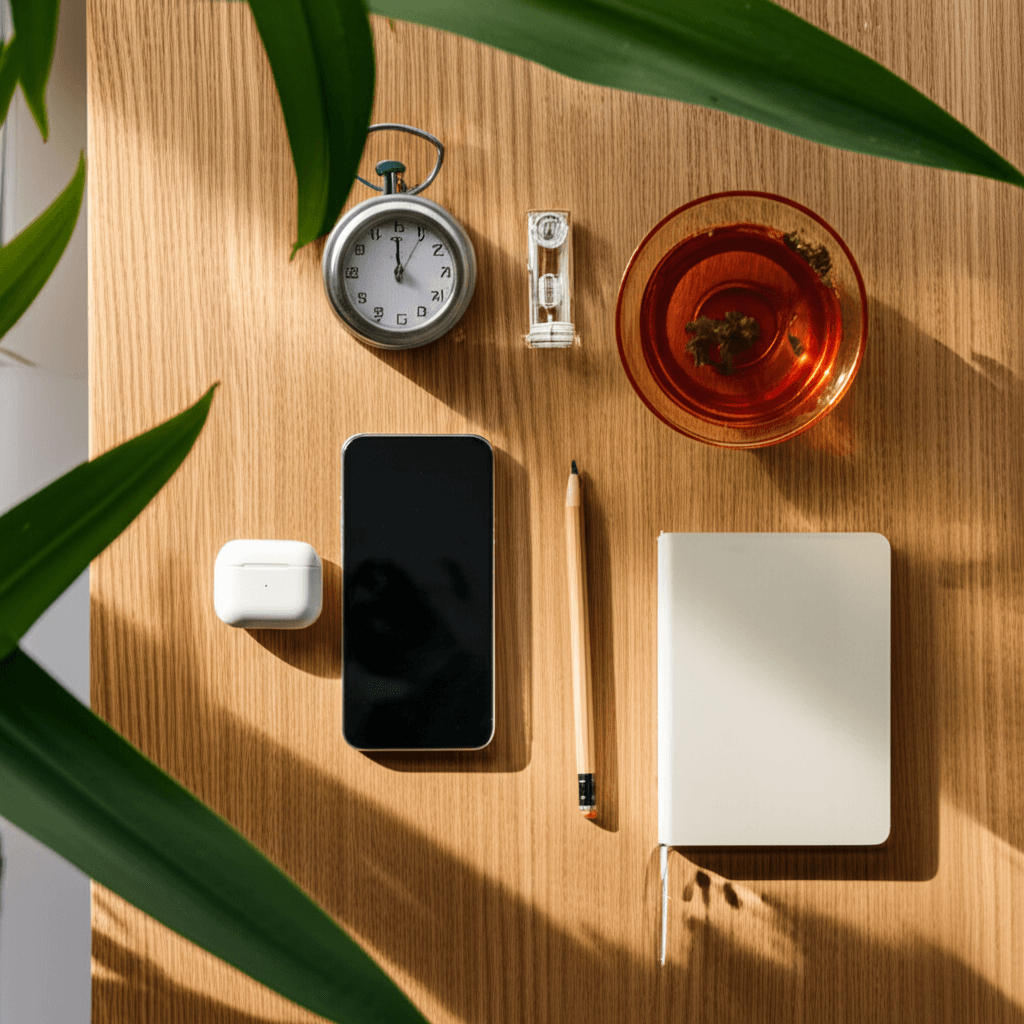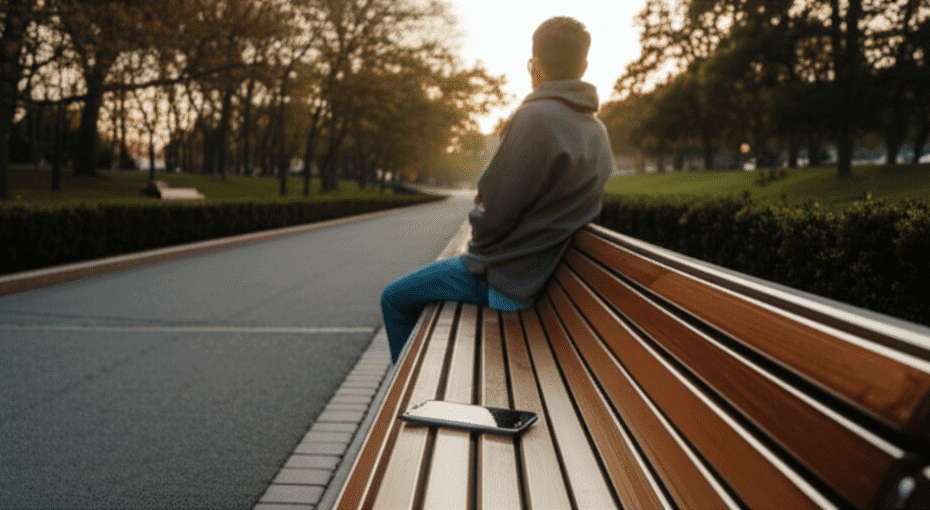Digital overload and anxiety
In our increasingly connected world, the constant hum of notifications and the endless scroll of digital feeds have become a pervasive backdrop to our daily lives. While technology offers undeniable conveniences and bridges distances, it also presents a unique challenge to our mental well-being.
Many of us experience a subtle, yet persistent, unease that can often be traced back to our digital habits—a phenomenon aptly described as phone breaks anxiety. This pervasive feeling arises when we’re constantly checking our devices, feeling compelled to respond, or even just anticipating the next notification.
It’s a tension that builds, often without us fully realizing its source, contributing to a sense of being perpetually 'on' and never truly at rest. Recognizing this subtle stress is the first step toward reclaiming a sense of calm and control.
Why a digital detox helps
The concept of a digital detox for mental health has emerged as a crucial strategy for navigating this modern dilemma. It's not about abandoning technology entirely, but rather about consciously and strategically disengaging from it to create space for reflection, connection, and peace. Think of it as hitting the reset button for your mind, allowing you to step away from the digital noise and reconnect with the present moment.
The benefits extend far beyond simply feeling less overwhelmed; a thoughtful digital detox can enhance focus, improve sleep quality, strengthen real-world relationships, and significantly reduce feelings of anxiety and stress that often accompany excessive screen time. It’s about cultivating a more intentional relationship with your devices, rather than letting them dictate your attention and emotional state.

Set boundaries for screens
One of the most practical strategies for embarking on a digital detox is to establish clear boundaries around your screen time. This could involve designating specific 'no-phone zones' in your home, such as the bedroom or dining table, transforming these spaces into havens of uninterrupted conversation or quiet contemplation. Similarly, setting 'no-phone hours'—perhaps the first hour after waking or the last hour before bed—can dramatically shift your daily rhythm, allowing you to start and end your day with greater presence.
These small, consistent changes can help mitigate phone breaks anxiety by reducing the constant temptation to check for updates. By creating these intentional barriers, you begin to break the cycle of reflexive checking and pave the way for more meaningful engagement with your immediate surroundings.
Choose richer offline activities
Another powerful tactic involves transforming passive screen time into active, engaging offline activities. Instead of mindlessly scrolling through social media, pick up a book, go for a walk in nature, practice a creative hobby, or engage in a conversation with a loved one. These activities not only provide a welcome distraction from digital demands but also nourish your mind and spirit in ways that screen time often cannot.
The goal is to fill the void left by reduced screen time with experiences that genuinely enrich your life and foster a sense of accomplishment or joy. This proactive approach helps to reinforce the positive aspects of a digital detox for mental health, making the transition feel less like deprivation and more like an opportunity for growth and discovery.

Mindfulness and a digital audit
Mindfulness and meditation practices can also be incredibly supportive tools in your digital detox journey. Incorporating even a few minutes of mindful breathing or meditation into your day can help you become more attuned to your internal state, allowing you to notice when digital overload is contributing to your stress levels. By cultivating a greater awareness of your thoughts and emotions, you can make more conscious choices about how and when you engage with technology.
This heightened self-awareness empowers you to recognize the early signs of phone breaks anxiety and take proactive steps to disengage before it escalates. These practices are not just about relaxation; they are about building mental resilience against the incessant demands of the digital world. Consider conducting a 'digital audit' of your device usage. Many smartphones now offer built-in tools that track your screen time and app usage.
Taking an honest look at where your time is actually going can be a revealing experience and provide concrete data to inform your detox strategy. You might discover that certain apps are disproportionately consuming your attention, or that your total screen time is far higher than you imagined. Armed with this knowledge, you can then make informed decisions about which apps to limit, mute notifications for, or even uninstall. This data-driven approach allows you to tailor your digital detox to your specific habits, making it more effective and sustainable in the long run.
Strengthen connections and persist
Engaging in social activities that don’t revolve around screens is another vital component of a comprehensive digital detox. Plan face-to-face meetups with friends, join a local club, volunteer for a cause you care about, or simply spend quality time with family. These real-world interactions provide invaluable social connection and emotional support, which are often diluted or distorted in purely online environments. Strengthening these bonds can serve as a powerful antidote to the isolating effects of excessive digital consumption and help alleviate phone breaks anxiety by reminding you of the richness and spontaneity of offline life.
The laughter, shared experiences, and genuine empathy found in human connection are irreplaceable. It's important to approach a digital detox with patience and self-compassion. Like any habit change, it takes time and effort. There will be moments when you instinctively reach for your phone, or when the urge to check social media feels overwhelming.
Acknowledge these urges without judgment and gently redirect your attention. Remember that the goal is not perfection, but progress. Each small step you take towards reducing your reliance on digital devices contributes to a healthier, more balanced relationship with technology and promotes overall digital detox mental health. Celebrate your successes, learn from your setbacks, and continuously adjust your strategies to find what works best for you and your unique lifestyle.
Ultimately, a digital detox is about more than just limiting screen time; it's about cultivating a more mindful and intentional way of living in a digitally saturated world. By actively managing your digital consumption, you empower yourself to reduce phone breaks anxiety, enhance your mental clarity, and foster a deeper connection with yourself and the world around you. It’s an ongoing process of self-discovery and adjustment, but one that offers profound rewards in terms of peace of mind, improved well-being, and a renewed appreciation for the richness of offline experiences. Taking control of your digital habits can unlock a greater sense of calm and presence, allowing you to thrive in an age of constant connectivity without being overwhelmed by it.
Embarking on a digital detox is a powerful step towards a calmer, more focused you, helping to alleviate the subtle stresses of constant connectivity. As you nurture your mental well-being through mindful digital habits, consider also supporting your overall health with trusted supplements. Quietum Plus offers a unique blend of ingredients aimed at supporting ear health and cognitive function, contributing to your body's holistic balance. Explore how a conscious digital approach, combined with thoughtful health supplements, can empower your journey toward enhanced well-being.
Disclaimer: This post contains affiliate links. We may earn a small commission at no extra cost to you. This helps us keep our blog running.
